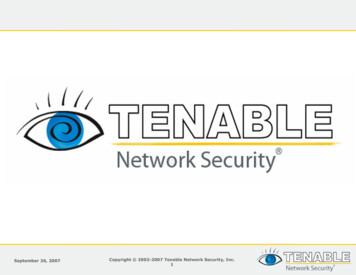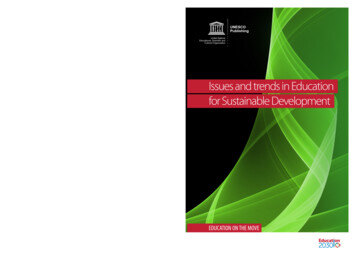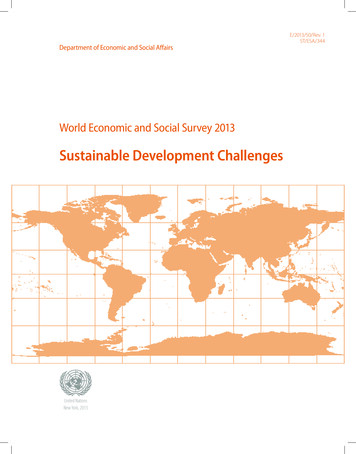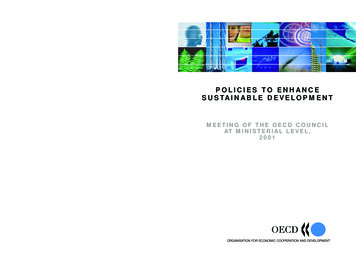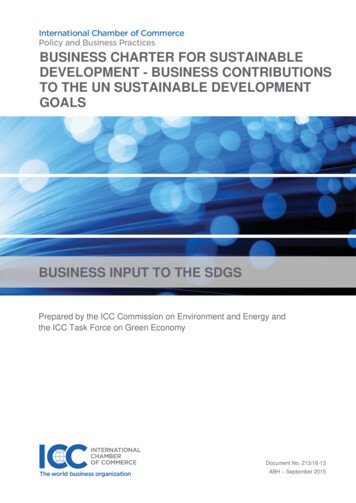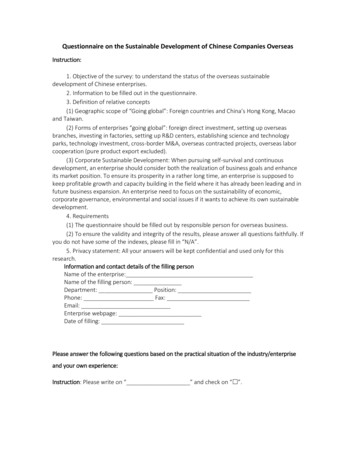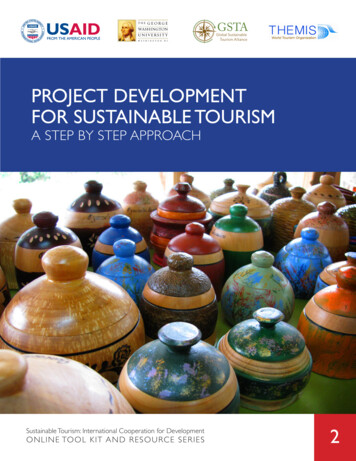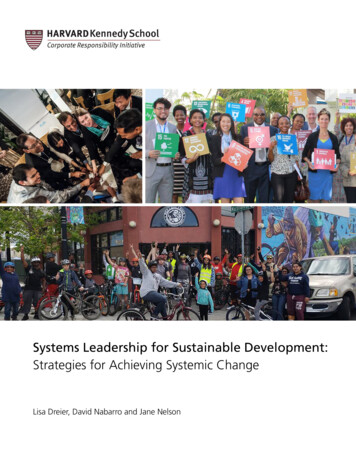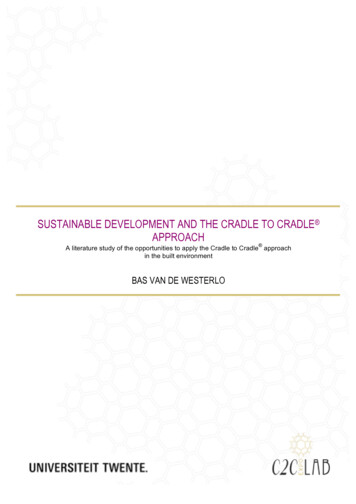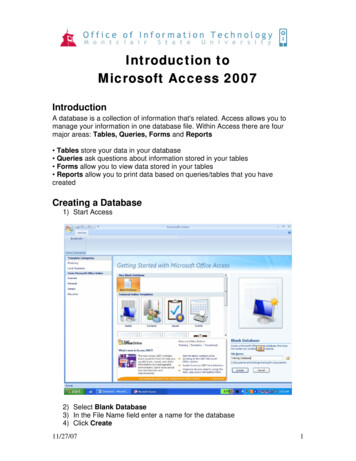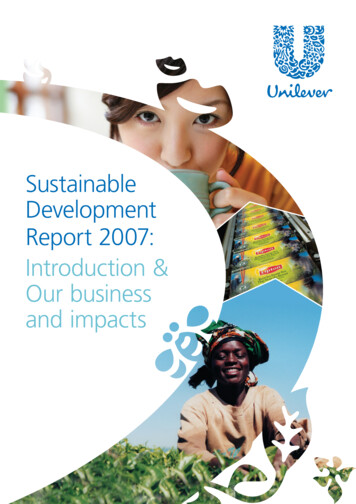
Transcription
SustainableDevelopmentReport 2007:Introduction &Our businessand impacts
Introduction and Our business &impactsWelcome to Unilever's Sustainable Development Report 2007 wherewe set out our approach and performance on the sustainabilityissues facing our business.ContentsPatrick Cescau’s introduction .2About this report.4Assurance .5Our business & impacts.6Our impacts .8Our brands in society . 11Our values & strategy . 14Our values . 15Strategy & governance. 17Governance . 22Engaging with stakeholders . 25Measurement. 32Reporting . 33Unilever Basis of Reporting 2007 . 36Awards & recognition . 41Regional awards. 43This section of the online Sustainable Development Report 2007 is availableat: tainabledevelopment-report/ceo-introduction stainable-developmentreport/business-impacts
Patrick Cescau’s introductionUnilever's mission is to add Vitality to life and to do this in asustainable way.Reviewing our progress2007 was a good year for Unilever. Ourunderlying sales grew by 5.5% - the thirdconsecutive year of accelerating salesgrowth. At the same time, despite rapidlyrising commodity costs, we made progresstowards achieving our 2010 target for anoperating margin in excess of 15%.Throughout the year we have sought to live up to our long-standingcommitment to sustainability and responsible business practice.Our Vitality mission sets out our goal to meet the everyday needs of peopleall around the world for nutrition, hygiene and personal care.Our strategyOur Vitality mission sets out our goal to meet the everyday needs of peopleall around the world for nutrition, hygiene and personal care.Our corporate responsibility strategy seeks to address Unilever's mostsignificant sustainability impacts – greenhouse gases, water, packaging andagriculture. Whilst we have made good progress under all these headings in2007, the highlight has been agriculture.Our commitment to sustainable teaOver two-thirds of Unilever's raw materials come from agriculture and wehave been working with suppliers for more than a decade on moresustainable farming practices. Building on this work we have committedourselves to source all our tea from sustainable sources by 2015.Since Unilever buys 12% of the world's black tea crop from 7,500 estates,spread across three continents, this is a massive undertaking. We reached animportant milestone in the early part of 2008 with the appearance of PG Tipsand Lipton tea in Western Europe using Rainforest Alliance CertifiedTM tea.We are confident that this initiative will improve the livelihoods of some 2million people in our extended supply chain. We also believe that we will sellmore tea.
Integrating sustainabilityThe example of tea illustrates well our new approach to sustainability. Whatwe are seeking to do is to integrate all our sustainability initiatives into theday-to-day marketing and R&D plans of our brands. Sustainability in Unileveris not something that is done by a few boffins in our laboratories. It is verymuch part of the way we do business and is the responsibility of everyone.Our experience with tea also exemplifies two other aspects of our approach.The first is the importance of working with external partners who bring newperspectives and new knowledge. The Rainforest Alliance is just one of manybodies with whom we work. Others include UNICEF on hygiene education andclean drinking water, Greenpeace on climate-friendly refrigeration, theFairtrade Labelling Organisation on ethical trading and poverty relief, andOxfam on poverty.A value chain approachThe second distinguishing feature of our approach is the growing importanceof addressing sustainability right across our value chain – from the sourcingof raw materials through to consumer use and disposal of our products.Water is a case in point. Historically our programmes have focused on thevolume of water used in our factories – a figure which we have reduced bymore than half over the past decade. However because a big part of ourwater footprint is in consumer use of our brands, our product developers areincreasingly focusing their attention on reducing the quantities of water thatare required to use our products. Building on the success of Surf Excel QuickWash laundry detergent, this has led to innovations such as Comfort andVivere fabric softeners – both of which allow people to do their laundry withsignificantly less water.In Unilever we recognise that we can only achieve our long-term businessobjectives if we find more sustainable ways of conducting our affairs. Wehave known for a long time that good environmental practice is good for thebottom line – since it tends to drive out waste and reduce costs. The morewe learn about sustainability, the more we are convinced that it is the rightthing for all our stakeholders – the people we employ, our investors, oursuppliers and the consumers and communities that we serve.We are convinced that we can do well for our shareholders, by doing good inthe world in which we operate.Patrick CescauGroup Chief ExecutiveUnilever
About this reportWelcome to Unilever's Sustainable Development Report 2007. Readabout our approach and performance on the key sustainability issuesfacing our business.Sustainable Development Report 2007In this, our online Sustainable Development Report 2007, we coverthe wide range of issues related to our social, environmental and economicperformance. It covers both the issues we have identified as our mostmaterial impacts, but also more specialist topics of interest.The Report addresses the following questions: How do Unilever's business activities affect the environment andsociety?How do Unilever's brands make a difference to the health and wellbeing of consumers?How is Unilever addressing the sustainability challenges related toclimate change, water, packaging, and sourcing of agricultural rawmaterials?How do Unilever's operations create wealth and how does this benefitstakeholders such as employees and suppliers, and local communities?How do we manage the sustainability and corporate responsibilityissues related to some of our key stakeholders including consumers,customers, employees, suppliers, local communities and government?We have also produced an accompanying Sustainable Development Overview2007 – a 34-page printed publication that explores the issues we haveidentified as our most significant impacts including nutrition, hygiene, climatechange and more.The principal audiences for both the online Report and Overview are ouremployees, customers, consumers, investors, governments and opinionformers in the fields of sustainability and business responsibility.
AssuranceInternal and external assurance is an important part of our approach.Our approachAccuracy and reliability of reported information is assured through ourinternal management and information systems, with each section formallyapproved by the relevant functional manager and the entire report signed offby senior corporate executives.Our environmental reporting has been supported by independent externalverification since we first started reporting in 1996 and our social report wasverified for the first time in 2004.Since this date we have had each of our reports externally assured.In 2007, limited assurance on 10 environmental and occupational safetyperformance indicators contained within our Sustainable Development Report2007 has been carried out by Deloitte & Touche LLP.Deloitte's report, which sets out the scope of the assurance work performedon these indicators and their qualified inclusion, is now available. See relatedlinks below.Available online:DownloadIndependent assurance report by Deloitte & Touche LLP to Unilever PLC onthe online Group Sustainable Development Report 2007 (13 May 2008) (50KB)
Our business & impacts160 million times a day, someone, somewhere will choose a Unileverbrand.About UnileverUnilever is one of the world's leading consumer goods companies. Our strongportfolio of 400 foods, home and personal care brands is trusted byconsumers everywhere. We have operations in around 100 countries and ourproducts are on sale in about 50 more.With consumers, customers, employees, suppliers and shareholders on everycontinent, we describe ourselves as a 'multi-local multinational', bringing ourinternational expertise to the service of people everywhere.The Americas Operating profit (millions): 1 971Turnover (millions): 13 442Purchases of goods and services (millions): 9509Employees (year end): 43 000Manufacturing sites: 74Europe Operating profit (millions): 1 678Turnover (millions): 15 205
Purchases of goods and services (millions): 10 373Employees (year end): 43 000Manufacturing sites: 71Asia Africa Operating profit (millions): 1 596Turnover (millions): 11 540Purchases of goods and services (millions): 8 954Employees (year end): 88 000Manufacturing sites: 139Savoury, dressings & spreads Turnover (millions): 13 988Underlying sales growth: 5.0%Ice cream & beverages Turnover (millions): 7 600Underlying sales growth: 4.2%Personal care Turnover (millions): 11 302Underlying sales growth: 6.7%Home care Turnover (millions): 7 297Underlying sales growth: 6.1%
Our impactsOur business and brands have impacts at every stage along theproduct life-cycle: from concept to consumption.Understanding consumer needsOur aim is to meet consumers' everyday needs fornutrition, hygiene and personal care.What we do: Make high-quality products that are safe to useMake products affordable and accessible to consumersUnderstand the environmental constraints, such as water scarcity,within which consumers use our productsInnovation & R&DThrough our investment in research and development,we aim to meet the diverse and changing needs ofconsumers in all our markets.What we do: Enhance the nutritional quality of our foodsMinimise the adverse environmental impacts of our productsIncorporate social, economic and environmental factors into branddevelopment plans, using Brand Imprint methodologyResearch and promote alternatives to animal testingCollaborate with academic and business partners around the worldSuppliersWe aim to encourage sustainability practices in oursupply chain. Through responsible sourcing, we seek toraise standards in line with the requirements set out inour Business Partner Code.What we do: Ensure fair working conditions in the supply chain and respect forhuman rights
Ensure suppliers meet standards on health, safety and environmentalprotectionWork with other companies to define common supplier assessmentprocesses and share performance dataWork with our agricultural suppliers and growers to move towardsmore sustainable growing practicesProduction & manufacturingWe seek to manage the impacts of our operations onsociety and the environment.What we do: Protect the health and safety of employees at workRespect employees' fundamental rights and encourage personaldevelopmentInvest in local communities and contribute to local economicdevelopmentImprove the eco-efficiency of our manufacturing sites and setambitious targets, particularly for CO2 emissionsDistribution & retailOur aim is to be the supplier of choice for our customersand to ensure that consumers have ready access to ourproducts through different distribution channels.What we do: Work in partnership with retailers on sustainability issuesSupport retailers in educating consumers on health and sustainabilityissuesReduce environmental impacts resulting from distribution of ourproductsEnsure consumers everywhere have access to our productsUse and promote environmentally-friendlyrefrigeration technologyMarketing, consumption &disposalWe communicate responsibly with our consumersthrough our advertising and marketing.
What we do: Take a responsible approach to marketing and advertisingHelp consumers make healthier choices in their dietWork to ensure consumer confidence in chemicals used in home andpersonal care productsHelp consumers to reduce their environmental impacts and to disposeof our products responsibly
Our brands in societyBy addressing social and sustainability issues, our brands can make a realdifference and create growth opportunities for our business.Consumer trends & market opportunitiesThe world is experiencing unprecedented social,economic and environmental change. The globalchallenges of poverty, malnutrition, poor health anddisease are becoming more acute and more complex,while the effects of climate change are being felt onevery continent.For some companies this represents a threat but for others it provides a hugeopportunity for innovation and growth.Many of the world's social and environmental challenges are felt most acutelyin developing and emerging countries. For example, it is these countries thatwill suffer the worst effects of climate change. However, given their rate ofeconomic development, these are also the very markets that will be the mainsource of growth for Unilever in future.Companies that can develop products that meet thefunctional needs of consumers while taking into accountthese social and environmental challenges will be betterplaced to grow than those that do not.Another significant trend in recent years has been the emergence of'conscience consumers' – people who want to make a positive difference tothe world through the brands they choose to buy. From being a minoritygroup of consumers seeking out a small selection of mostly niche brands, thishas become a more mainstream movement, with large numbers of peoplenow actively seeking out products with a positive social or environmentalbenefit or avoiding those that are perceived as having a negative impact.Our approachAnticipating that this would become a big trend, the Unilever Executivedecided in 2005 that social, economic and environmental factors should beintegrated more deeply into the development and innovation plans of ourbrands. This is now a core element of our corporate responsibility strategy.To help evaluate the risks and opportunities presented by this agenda, wedeveloped an approach called Brand Imprint. This provides our brand teamswith a 360º scan of the social, economic and environmental impact that theirbrand has on the world.
Making progressThe first brands to conduct a Brand Imprint were Dove and Lipton in 2006.By the end of 2007, 14 of our global and regional brands had been throughthe process and we are aiming for all our major brands to complete a BrandImprint by the end of 2008.Brand Imprint is about new product development, so results will not alwaysbe immediate, as it often takes time for innovations to reach consumers. Butit is equally about better managing our impacts. When innovations doemerge, we want to be sure that they are underpinned by credible action,evidence and performance. Therefore, factoring in the views of externalstakeholders, NGOs and opinion formers is a key part of the process.What we are already finding is that the process is creating greaterconnectivity between brands, their supply chains and their consumers. It isalso helping to integrate our work on greenhouse gases, water, packagingand sustainable agriculture more effectively into ourmarketing plans.Lipton leads the way on teaIn spring 2006, representatives from different parts ofUnilever, including marketing, supply chain, R&D andagronomists, met at our tea estate in Kericho, Kenya. Formonths previously, data on tea sourcing, tea pricing andresearch into tea drinkers' concerns as citizens had been gathered, ready tobe analysed and debated.This group decided that the low prices being paid to millions of tea growersand pluckers was unacceptable and that Unilever, as the world's largestbuyer of black tea, should lead the industry in finding a solution. The teaindustry has been suffering for years from oversupply, causing the price oftea to drop by 35% over 25 years. As a consequence, up to 2 million teagrowers and pluckers, including an estimated 1 million in sub-Saharan Africa,have been living on extremely low incomes.Research showed that consumers are also concerned about theenvironmental impacts of tea cultivation and production.A ground-breaking commitmentUnilever's contribution to the solution was to commit to purchasing all ourtea from sustainable, ethical sources. After evaluating several certificationroutes, we decided that the Rainforest Alliance's certification was the mostappropriate because of its comprehensive approach towards sustainable farmmanagement, covering social, economic and environmental aspects. This isvery much in line with the way we have been managing our own SustainableAgriculture Programme over the years.
Lipton is the world's best-selling tea brand, available in over 110 countriesand with sales of around 3 billion. By 2010, we aim to source all the teaused in Lipton Yellow Label and PG Tips tea bags sold in Western Europefrom Rainforest Alliance Certified TM farms, and by 2015 this will apply to allLipton tea bags sold globally. This is the first time a major tea company hascommitted to introducing sustainably certified tea on such a large scale, andthe first time Rainforest Alliance has audited tea farms.We expect that certified tea, both from large tea estates and from smallfarmers, could command a 10-15% higher price at auction and we estimatewe will be paying farmers 2 million more per year for our tea by 2010 and 5 million more per year by 2015.Working with Rainforest Alliance"Unilever is taking an exciting leadership position bymainstreaming its commitment to sustainability throughits brands. Our work with Unilever on tea sustainabilitywill help improve working conditions for tea growers andhelp them access better markets and better prices."Tensie Whelan, Executive Director, Rainforest AllianceA strong beginningThe first tea farm to meet the standards required forcertification was our own tea estate in Kericho, which haspioneered sustainable tea production for many years.Other tea farms in Kenya, Tanzania, Malawi, Indonesia,India, Argentina and Sri Lanka are following. Eventuallycertification will extend to thousands of farms in Africa, South America andSouth East Asia, improving the crops, incomes and livelihoods of around 2million people on three continents.The first certified tea was sold to restaurants and the catering trade inEurope in August 2007. In early 2008 it became widely available acrossEurope under our PG Tips and Lipton brands and in Japan as Lipton Goryoku.
Our values & strategyWe meet everyday needs for nutrition, hygiene and personal carewith brands that help people feel good, look good and get more outof life. Our aspiration is to meet these needs in a sustainable way.Values & strategyAt the heart of our corporate purpose is the drive to grow sustainably and inthis way create long-term value for all those with a stake in the business.Our efforts are guided by our Code of Business Principles which sets thestandards of behaviour we demand from all our employees. It also outlinesour commitments to our stakeholders including consumers, customers,suppliers, employees, communities and the environment.To fulfil our commitments, we have a strategy in place supported bycompany-wide governance and management structures.
Our valuesWe aim to manage and grow our business successfully round theworld as a trusted corporate citizen, respected for the values andstandards by which we behave.Our shared valuesWe have a set of shared values. Our values guide the way in which we dobusiness and influence the way we think and act. It is by putting theseshared values into everyday working practice that we can operatesuccessfully as a company.Our values are expressed in our Corporate Purpose and Vitality Mission. OurCode of Business Principles guides how we live them out on a day-to-daybasis. Our Business Partner Code sets out what we expect of our suppliers.Corporate Purpose & Vitality MissionWe first articulated our Corporate Purpose in 1996. Articulating our CorporatePurpose did not invent something new but made clear what we believe is theessence of our company. It describes what Unilever aspires to be as well asexpressing our values and beliefs. We updated our Corporate Purpose in2005 to express our new Vitality Mission: "to meet the everyday needs ofconsumers for nutrition, hygiene and personal care with brands that helppeople feel good, look good and get more out of life". Our Corporate Purposeand Vitality Mission together describe the factors that we believe willcontribute to our long-term success. They also underpin our commitment tomeet these needs in a sustainable way.Code of Business PrinciplesOur Corporate Purpose says that for us to succeed requires: "the higheststandards of corporate behaviour towards everyone we work with, thecommunities we touch and the environment on which we have an impact".Supporting this, our Code of Business Principles sets the framework ofstandards within which we work. The Code is supported by additionalworldwide operational standards on issues such as employee and productsafety.We regularly review the Code to ensure it meets the needs of today'sbusiness environment. Our latest revision was in 2001 and the updated Codewas rolled out across our business in 2002. The Code is a short document,written in clear simple language, stating overall principles. It is designed tobe easy to read and understand for all our employees. This is because webelieve the Code must have practical value in our day-to-day business. We
expect every Unilever employee to follow its principles in spirit as well as tothe letter.Our values in actionA code is no practical use unless it is part of an active process of compliance,monitoring and reporting. The Board of Unilever is responsible for thisprocess, with day-to-day responsibility lying with our senior managementaround the world.The Code is translated into nearly 50 languages and is communicated to allemployees.As part of our worldwide positive assurance process, each year our companychairmen give a written assurance that their business is in compliance withthe Code. The Board of Unilever reviews these responses. Internal audit isused to provide reassurance that the process is working satisfactorily.Any breaches of the Code must be reported in accordance with proceduresset by the Group Secretary of Unilever. Our Board will not criticisemanagement for any loss of business resulting from adherence to our Code.We expect and encourage employees to bring to our attention any breach ofthe Code and no employee will suffer as a consequence of reporting abreach. Since 2004 all employees worldwide have had access to a toll-free24-hour ethics telephone hotline. The hotline enables employees to raise anyconcerns in complete confidence, and anonymously if they wish.Our values & our business partnersWe rely on a huge network of business partners around the world. We seekto establish mutually beneficial relationships with them and expect oursuppliers to work in a way that is consistent with our own values andprinciples. Our Business Partner Code draws on our Code of BusinessPrinciples to set out ten clear standards we expect our suppliers to meet.Like our Code of Business Principles, our Business Partner Code isaccompanied by a positive assurance process.
Strategy & governanceTo fulfil our commitments, we have a strategy in place supported bycompany-wide governance and management structures.Our sustainability journeyOver 100 years ago, William Hesketh Lever and Samuel van den Bergh didnot just create the world's first consumer brands, Sunlight soap and BlueBand margarine: they built businesses with strong values and a mission toact as agents of social change.Sustainable development has become the overarching goal for business andgovernment. It demands that we meet the needs of society today withoutcompromising the ability of future generations to survive and prosper.A commitment to sustainable development and responsible business practiceis embedded in our mission and principles. In practice this meansunderstanding the impact we have as a business on society, not only in howwe run our own operations, but also in sourcing our raw materials and,crucially, through our brands.Our strategyIn 2007, the Unilever Executive agreed a revised strategy outlining ourcorporate responsibility and sustainability commitments. This builds on the2005 strategy which reinvigorated many of our existing activities includingour work on supply-chain standards, eco-efficiency, employee well-being andcommunity engagement.Our strategy focuses on areas where both the opportunities and challengesfor our business are most pressing, namely climate change, sustainableagricultural sourcing, water and packaging.It also cements our commitment to 'brand imprint' - the integration of social,economic and environmental considerations into the development plans ofour brands. As values-led brands will increasingly drive our business, thiselement of the strategy is central to our approach.We continue to focus our global partnerships on our Vitality themes ofnutrition, hygiene and sustainability, as the areas where we can make themost impact.
Our strategyStrategyProgress in 2007 To integrate social, economicand environmentalconsiderations into ourbusiness and brands To focus on climate change,water, packaging andsustainable agriculturalresources as our keysustainability themes To focus our globalpartnerships on nutrition andhygiene issues Brand Imprint process carried outwith 14 global brands.Completed assessment of 22 000food and beverage products as partof our Nutrition EnhancementProgramme.Our Global Health through HygieneProgramme's smart sensortechnology was independentlyendorsed by leading experts aseffective in evaluating handwashingcampaigns.Launched new climate changestrategy with targets forCO2 reduction.Improved eco-efficiency performancein four of our seven key measuresbut underperformed on waste(hazardous and non-hazardous) andCO2 from energy.Announced commitment to source allour tea from sustainable, ethicalsources and to work with theRainforest Alliance.Our partnership with the UN WorldFood Programme provided 15 millionmeals to 80 000 school children.Continued Love your Heart campaignpromoting heart health with theWorld Heart Federation.Launched new oral care mission toencourage day and night brushing,building on our partnership with theFDI World Dental Federation.Agreed strategic focus onhandwashing and safe drinking waterwith UNICEF, supported by projectsin Uganda and India to demonstratepotential.
To continue to work on oureco-efficiency, supply-chainmanagement, employee health& safety and communityinvestment Continued activity and progressagainst each of these areas.Management & implementationTo implement our strategy we have a series of management structures inplace. The most important of these are:Safety & Environmental Assurance Centre (SEAC)SEAC's role is to provide independent scientific evidence and guidance sothat Unilever can identify and manage: risks for consumers, workers and the environment with regard to thesafety of products and supply chain technology; andenvironmental impacts, with regard to the sustainability of Unilever'sbrands, products and supply chain.Unilever Food & Health Research InstituteAround 450 scientific staff work on the development of new products andprocesses and continuously improve the nutritional quality of our products,often in conjunction with external partners. The Institute shares anddiscusses our research widely, through publication in journals and an annualsymposium involving external scientific experts.Global Health through Hygiene ProgrammeThe aim of this programme is to co-ordinate Unilever's efforts to make ameasurable contribution to the health and hygiene of people around theworld through practical, community-based initiatives. The programme takessuccessful initiatives from one brand or country and tailors them to addressconsumer hygiene needs elsewhere.Sustainable Agriculture Steering GroupThe Steering Group is responsible for managing our Sustainable AgricultureInitiative. Its objective is to promote sustainable supply chains worldwide,focusing on long-term, sustainable access to Unilever's key crops. TheSteering Group also benefits from the input of the Sustainable AgricultureAdvisory Board which consists of external experts.Other programmesOur Greenhouse Gases Working Group and the Responsible PackagingSteering Team are two current examples of how teams come together towork on specific issues. These groups work to assess Unilever's footprint,formulate strategy, work with category and brand teams to set specific goals
and support the teams in imple
agriculture. Whilst we have made good progress under all these headings in 2007, the highlight has been agriculture. Our commitment to sustainable tea Over two-thirds of Unilever's raw materials come from agriculture and we have been working with suppliers for more than a decad
